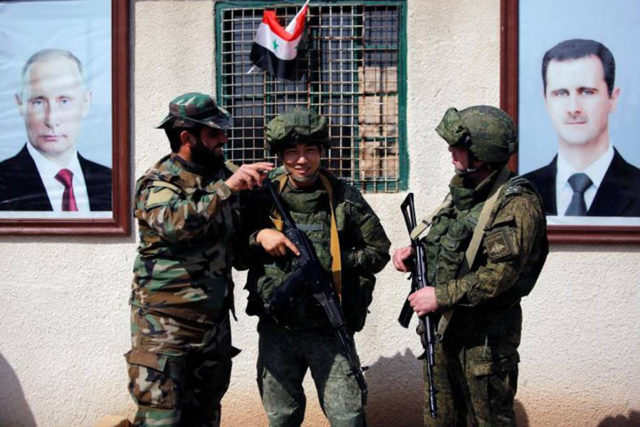While staying out of the horrific Syrian Civil War (except humanitarian aid at the border), Israel has long had three red lines for what happens in its northern neighbor:
- No Iranian or Hezb’allah bases near the Israeli border; revised to no Iran in Syria.
- No weapons delivered by Iran to Hezb’allah that Israel considers “situation-changing”
- No use of non-conventional weapons
A “deconfliction” agreement with Russia has allowed Israel to strike Syria when and where it believes a specific problems exists while generally avoiding civilian areas and civilians. Though the fighting has largely — though not totally — ended, the war has not. And this week, someone blew up something big in the Syrian port of Latakia. International media, including Israeli media, report that it was the Israel Air Force that did it. All of them, including Israel, cite only Syrian sources. The IDF, as is its practice, said nothing.
A Russian air base just southeast of Latakia is one of the gifts President Vladimir Putin received from Syrian president Bashar Assad for Russia’s protection during the war and the air support for missions that included the delivery of chemical weapons. About fifty miles farther south is the Russian naval base at Tartus — another prize.
Could Israel have struck so close to Russian bases without notice? Without coordination? Without permission? This requires untangling.
High on Israel’s list of items to destroy are chemical weapons components and missile components. A combination of the two, plus Iran’s arming of Hezb’allah in Lebanon, is an unacceptable situation — and provocation — for Israel.
In 2014, the Obama administration declared that Syria’s chemical program had been destroyed after proof of the use of chemical weapons on Syrian civilians. In a remarkably precise statement, the U.N. Organization for the Prohibition of Chemical Weapons (OPCW) said 96% percent of Syria’s declared chemical weapons were destroyed. Not 95% or 87% or 43.5%, but 96% on the nose — and note the phrasing “declared chemical weapons.” By August of that year, however, the administration claimed that the Syrian munitions had been “fully destroyed” but acknowledged that the munitions factories had not been dismantled as required. According to then–U.N. secretary general Ban Ki-moon, at least one of twelve storage facilities remained open, and only five of eighteen production facilities had been closed.
In 2019, it was reported that Iran was operating a precision missile factory on the outskirts of Latakia. That same year, Iran leased part of the port, and, according to Israeli sources, has used the facility to supply weapons to both Syrian forces and to Hezb’allah in Lebanon. According to an Iran analyst at the time, the deal was done bilaterally (Iran-Syria), and Russia was not happy about being cut out.
In October 2020, it was reported that Syria was still trying to import the components of chemical weapons. This information should be seen in line with an apparent Israeli air strike in Syria in January 2021, in which, according to the Syrian Observatory for Human Rights, “[t]he Fatimid Brigade [an Afghan Hezb’allah unit] transported a consignment of Iranian-manufactured weapons to eastern Syria from neighboring Iraq[.] … They were stored in the region targeted overnight.”
Of late, Russia has been trying to wedge Assad back into polite society, and, according to some, Russian patience for Israeli military activity is wearing thin. On the other hand, to rehabilitate Assad, Russia needs to push Iran and its Hezb’allah and Afghan allies out. Russia can’t and won’t. Israel has to.
It is generally not a great idea to credit Syrian analysts with accurate information, but give journalist Maha Gazal this one:
Circles close to the Assad regime have spoken explicitly about Russian-Israeli coordination regarding the Latakia bombing. Air defenses were disrupted and no S-400 missiles, which are located at the Russian-operated Khmeimim Air Base some 20 kilometers from Latakia, were not fired.
Israel cannot bomb a target so close to Russia’s largest base in Syria without informing Moscow. It is a red line[.] … And thus, Russia is in fact one of the parties conspiring against Syria. This is what is currently being circulated on pro-regime social media and networking sites.
She noted that, contrary to the aftermath of other events, there was little official comment, and media coverage disappeared after the containers were removed.
According to a Jerusalem Post report, the Latakia raid destroyed “an immeasurable amount of advanced and strategic weaponry” sitting in the port because, owing to Israel’s activity, “Iran’s air, land, and sea corridors didn’t function for 70 percent of 2021.”
A Russia-Israel condominium of interest has long been working in Syria. It may be beginning to pay off.






